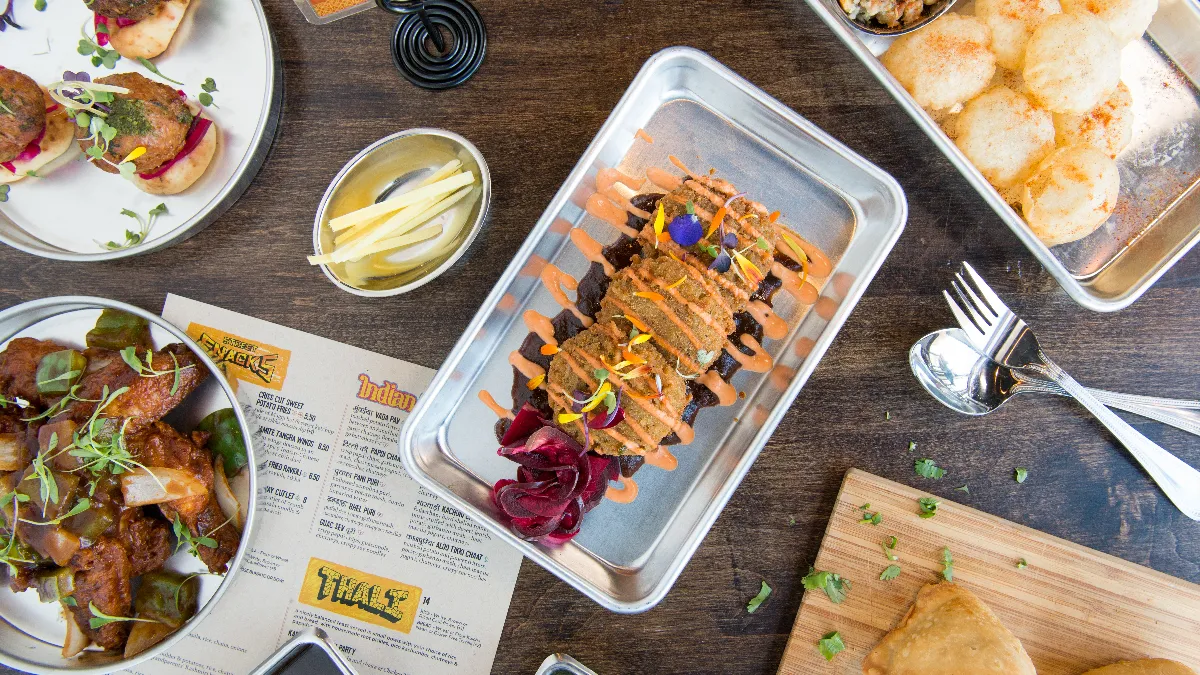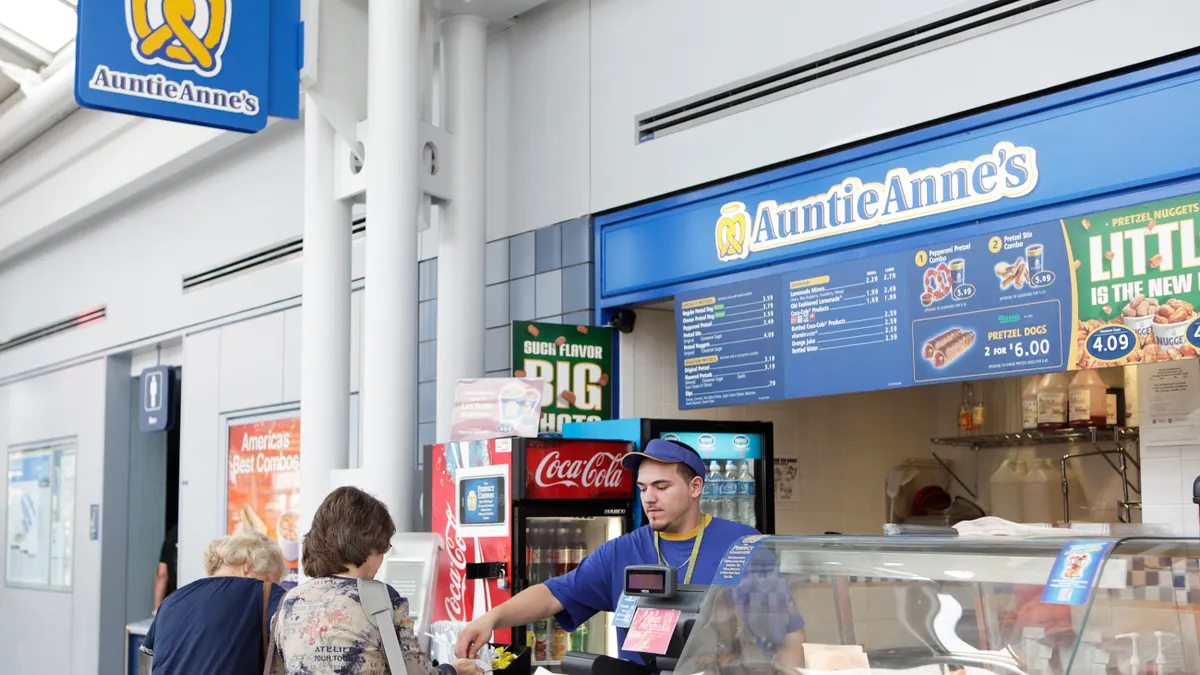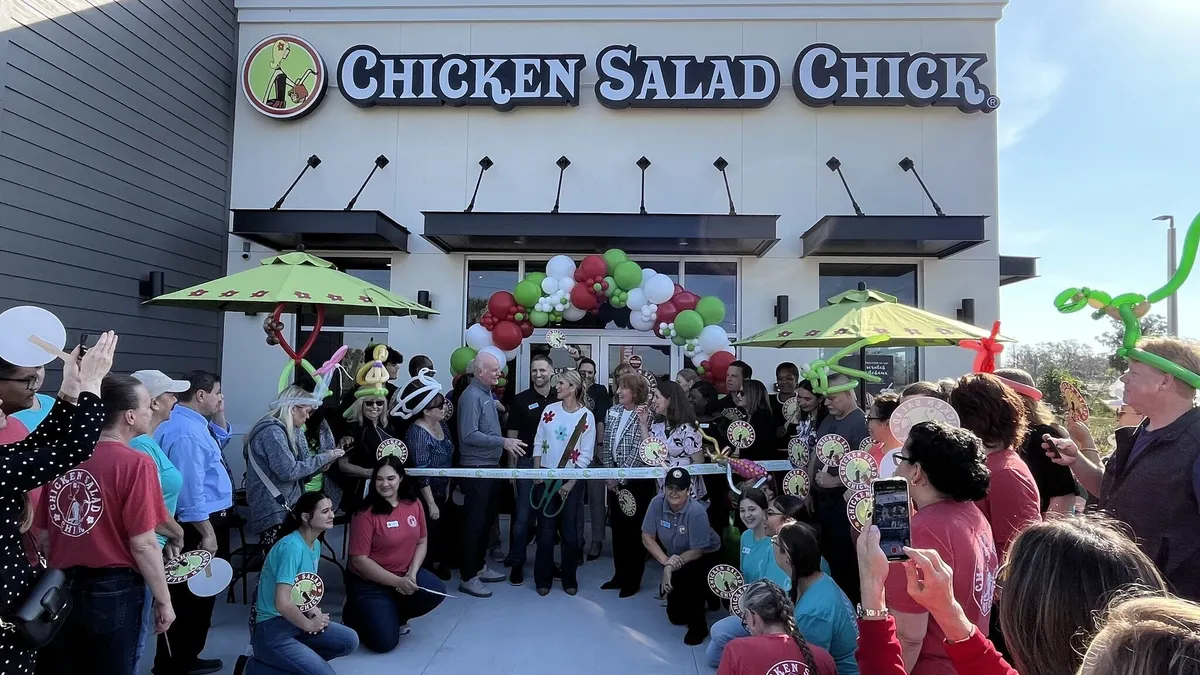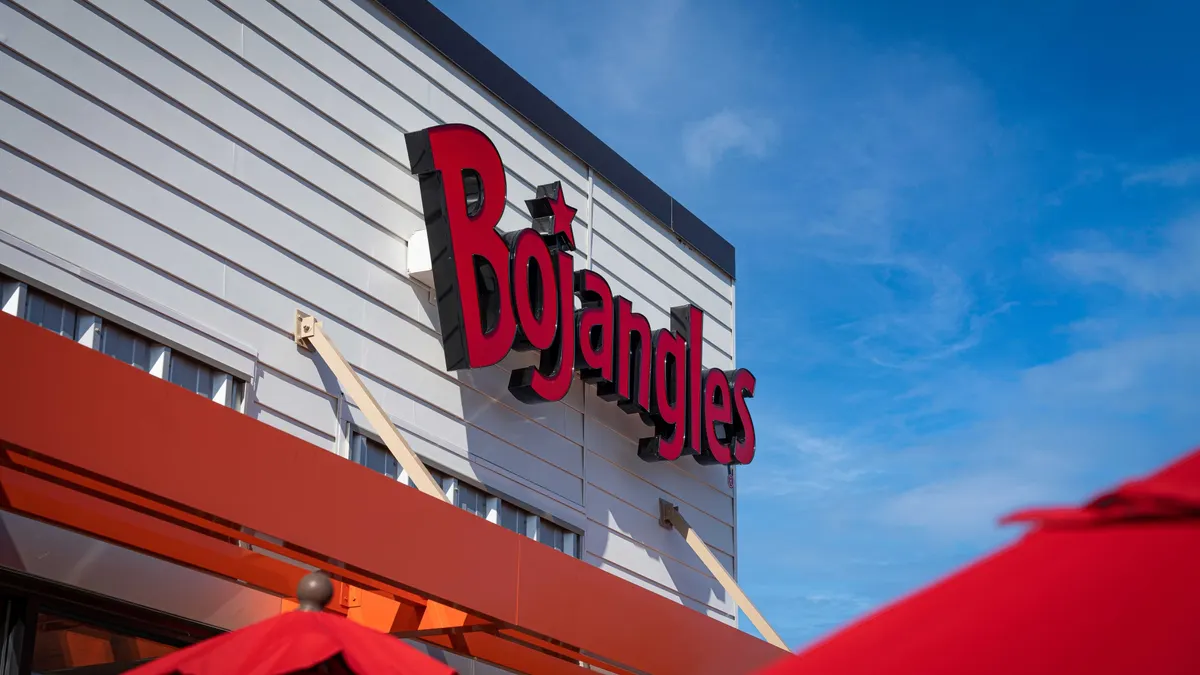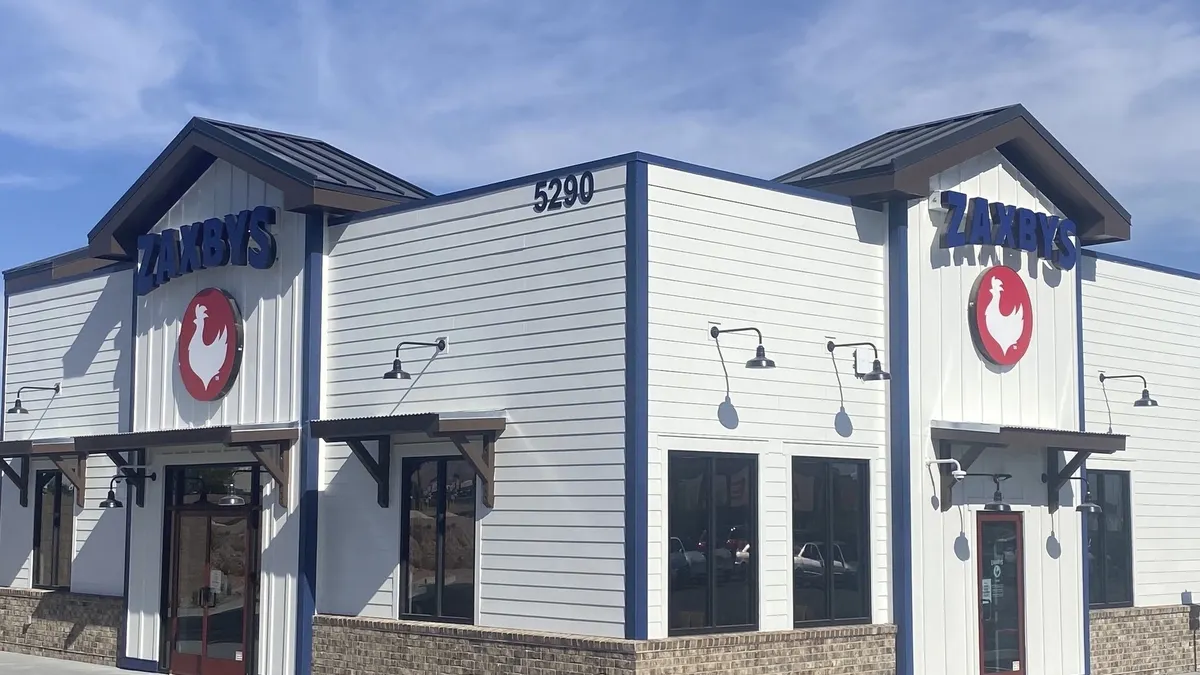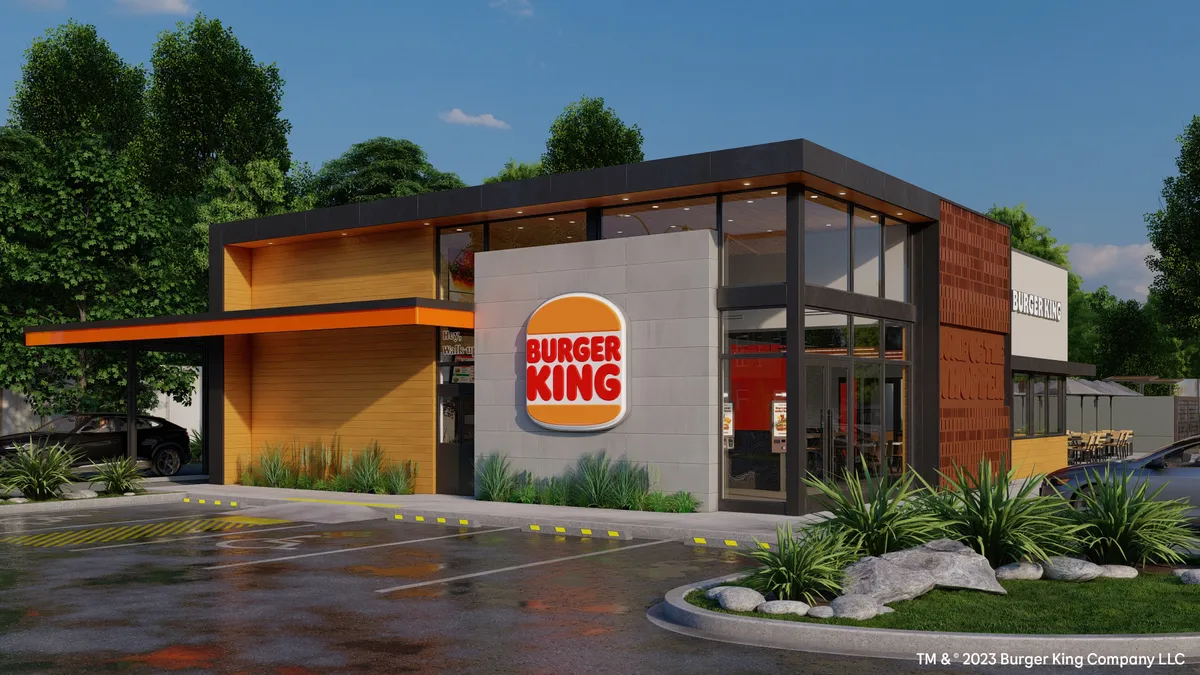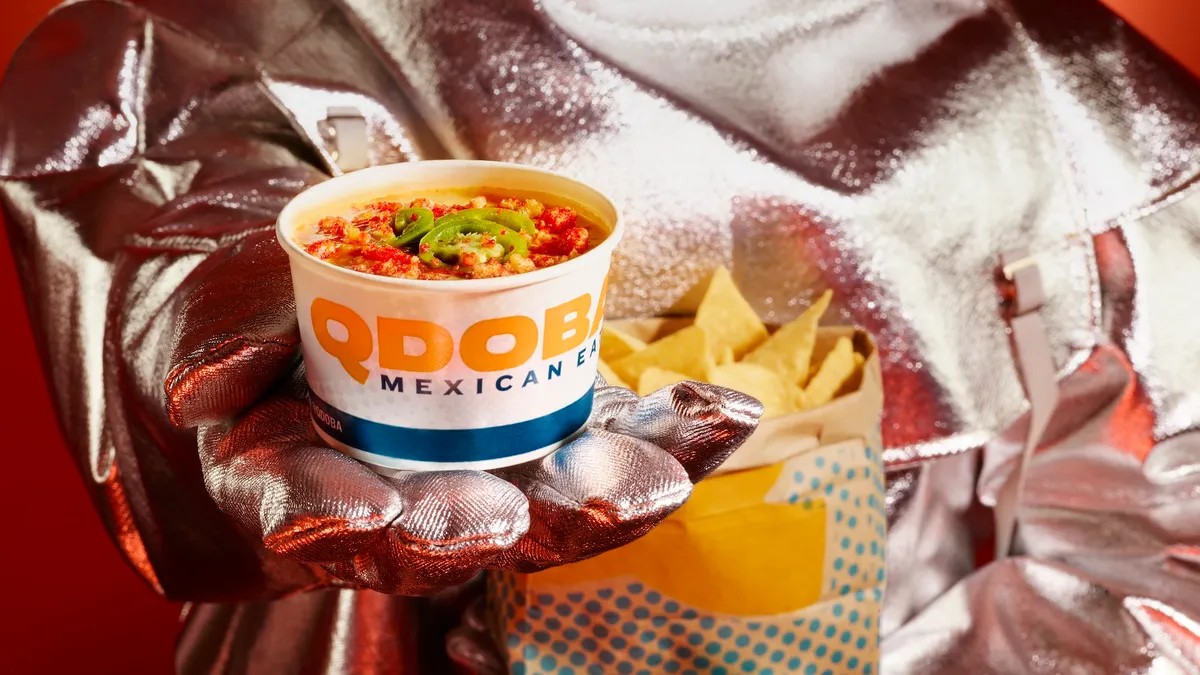This article is the third in a four-part series exploring the boom in restaurant franchising over the past 22 months. Next week, Restaurant Dive will look at obstacles and opportunities for franchising. Future articles will be posted here.
For Akash Kapoor, CEO and founder of Curry Up Now, his company’s expansion into Texas was inevitable. The 18-unit, Indian fast casual chain is based in San Francisco but offers food that is similar to Tex-Mex, which Kapoor said should appeal to Texas diners.
"I actually think that Texas might become a bigger state for us ... than California," Kapoor said.
The company plans to open one location in Austin, Texas, and another in Dallas this year, with more to come in Dallas — where the chain has signed three additional deals — and other markets. In August, Curry Up Now secured a multi-unit deal to open its first location in Fort Worth, Texas in 2022 as well. These markets have a second unique benefit for the chain. The number of diners migrating from California — especially the Bay Area — to Texas prime the Lone Star State with customers who already recognize the brand, he said.
Curry Up Now's first two Texas locations will also benefit from the large retail developments they are situated in. These spaces provide co-tenancy that Curry Up Now requires, capture more income and are less risky than street locations, where most of its Bay Area restaurants are located, he said. The restaurant also aims to be close to movie theaters — its first Dallas location will be near one — because those businesses provide more foot traffic, he said. The chain has expanded into Utah, Colorado, New Jersey and Georgia, as well.
Curry Up Now is just one of many fast casuals and QSRs expanding into Texas. Over the past 18 months, franchisors have signed deals to expand into both Texas and Florida due to their business-friendly environments and lenient COVID-19 policies, which are creating more opportunities to grow compared to other regions.
Papa John's signed a deal earlier this year with a franchisee for 100 units in Texas, which are slated to open by 2029. Franchisors like Blaze Pizza, Coolgreens, Hoots Wings and Marco's Pizza are also making plays in Texas. In Florida, Capriotti’s, Del Taco and Freddy's plan to open new locations.
"It's very exciting to build your brand in other states," Kapoor said.
Opening up in Texas could also lead to opportunities in nearby states like Tennessee or Kentucky, a prospect that is even more exciting for Kapoor.
"If we can make our food work there, then we can make it work anywhere. Texas is the first step, and it's a safe step for us, but I think sometime very soon, we’ll start taking some risks," Kapoor said.
Booming populations, few franchise restrictions prove enticing
As the second and third largest states in the U.S., Texas and Florida have shown significant and consistent population growth with no signs of slowing down, Carty Davis, founder and partner at independent investment bank C Squared Advisors, said. These states have also shown commitments to small businesses and have no state income tax, encouraging business owners to not just invest in these states, but live there, he said.
"Whether it be from a tax perspective [or a] licensing perspective, it's very easy to open a business and find success in Texas," Emily Williams Knight, president and CEO of the Texas Restaurant Association, said.
The Sunshine State doesn't have a statewide franchise law, either, which is attractive to businesses, Carol Dover, president and CEO of the Florida Restaurant and Lodging Association, said in an emailed statement.
Franchisors wishing to franchise in Florida don’t need to file registration documents with the Florida Department of Agriculture and Consumer Services and are exempt from filing disclosure documents under the Sale of Business Opportunities Act. Franchisors only need to file a Franchisee Exemption application and pay an annual fee of $100. Comparatively, California franchisors have to provide franchise disclosure documents and meet the state’s registration requirements. Initial registration fees cost $675 and renewal fees are $450.
"It is no surprise that businesses are leaving other restrictive states for Florida," Dover said.
Cost of living is also much lower in Texas and Florida, as are labor costs. Minimum wage in Texas is $7.25, for example. Comparatively, New York City and Los Angeles have a minimum wage of $15. Florida's minimum wage is at $10, but is slowly increasing by a dollar each year through 2026.
The pandemic further underscored stark differences between the two states and much of the rest of the country.
"As some states look to tighten restrictions with the delta variant concerns, Texas and Florida have resisted any efforts to return to more restrictive measures," Davis said. "These pandemic responses are more indicative of the overall business environment in the respective states."
Businesses in Texas and Florida had smaller pandemic-induced sales declines and more robust rebounds compared to other states — benefits operators are keeping in mind as they plot their expansion plans, Davis said. Both states also have more affordable real estate opportunities, especially for coveted standalone locations, than states like California and New York.
"[Texas' real estate is] hot whether it be commercial or not," Knight said, adding that a lot of virtual brands and ghost kitchens have experienced strong growth in Texas.
"With relocation opportunities in the COVID-19 and post-COVID-19 world, many smaller areas are seeing significant population growth and the viability of new sites," Davis said.
Texas and Florida also don't have large urban areas like New York, Chicago and Washington, D.C. While places like Dallas and Houston have downtown areas, they also have extensive suburban populations that are used to living and working in these markets, Dan Rowe, Fransmart founder and CEO, said. This is particularly beneficial since office populations in urban areas have yet to fully rebound.
That swath of suburban consumers is one reason why Tropical Smoothie Cafe likes working in these two states.Tropical Smoothie tends to add units in suburbs within its tertiary markets and secondary markets before launching in urban markets, CEO Charles Watson said. The smoothie chain, which was founded in Florida, has over 135 locations in Florida and is actively growing its presence in Texas.
Despite the growing interest in these states, Watson isn't concerned about oversaturation, especially because a lot of restaurants closed down during the pandemic, and there is still a lot of white space. Tropical Smoothie also benefits from having low startup costs — around $375,000 compared to $1.2 to $2.2 million for McDonald’s — and doesn’t need grills, deep fryers or heating systems.
"If it's Texas or Florida, the franchisors that did it right are seeing the benefits," Watson said.
Texas is racking up restaurant support initiatives
Texas' booming population is one of the top opportunities it poses for businesses looking to expand. With almost 30 million residents, it's expected to become one of the fastest-growing states in the country. Fifty-one percent of the state’s food spending comes from restaurants, Knight said.
Texas passed six of the Texas Restaurant Association's priority bills earlier this year, the most of any legislation section. This expands the state's support initiatives for restaurant recovery to include alcohol-to-go at restaurants and grocery stores, tax-free Paycheck Protection Program loan forgiveness for franchisees and liability protection for businesses operating during the pandemic, Knight said. The state also didn't raise unemployment taxes, unlike 31 states, which will be another blow to restaurants recovering in those markets.
With fewer regulations and oversights on businesses throughout the pandemic, Texas restaurants were only closed for about five weeks, allowing businesses to ramp back up more quickly, Knight said. By contrast, New York City didn’t reach full capacity for indoor dining until May of this year, while California didn't lift capacity and social distancing restrictions until June 15. The Texas restaurant industry, comparatively, was already back to 2019 sales levels as of July, Knight said.
Texas lost about 14% of its restaurants during the pandemic, which is only slightly more than closures that would occur during any given year, Knight said.
"I think that says a lot about how we got through this recovery," Knight said.
Dallas and Houston were also particularly supportive of restaurants. Both cities shut down streets to allow restaurants to expand onto patios, and in April 2020, Houston launched a campaign encouraging people to order delivery, takeout or drive-thru to support restaurants. Houston Mayor Sylvester Turner also sent letters to federal leaders urging them to assist restaurants, bars and nightclub owners in March 2020.
"When you have a friendly state and local business climate, it makes it a really great place to do business," Knight said.
Florida restaurants benefit from lax restrictions
Florida was among the most lenient states when it came to dining policies early in the pandemic. Restaurants in Miami-Dade were able to seat customers for outdoor dining after the first few weeks of the COVID-19 crisis, making it one of the first to do so in the country.
"We are pleased to see an increase in restaurants in Florida both in independent and franchise operations, especially after the difficult time that COVID-19 has caused for our industry," Dover said. "Under the proven leadership of Governor Ron DeSantis and our Legislature, our state government has demonstrated its support of business recovery, including businesses being fully open and subject to minimal regulatory expansion."
Over the past decade, the state also gained over 2.7 million residents and has a population of over 21 million as of April 2020, according to the Associated Press. During the pandemic, Tampa Bay and Miami have seen an influx of new residents as well as New York restaurant brands looking for a more insulated business environment, Mighty Quinn's co-CEO Micha Magid said.
Some chefs, for example, moved or expanded their operations to Florida during the height of dining room restrictions because the state's restaurants were recovering much quicker than New York City's. Chef Mario Carbone opened an Italian restaurant in Miami in January, for example, and it became so popular that it’s now difficult to get a reservation, according to the Associated Press. A lot of cooks, managers and other restaurant professionals have also moved into Miami, expanding the available labor pool.
Mighty Quinn's signed a deal with a franchisee to open its first unit in Tampa Bay this year, with plans to open up to 10 units in the state.
"Tampa Bay has maintained a very healthy dining market throughout the pandemic," Magid said. "It's not like we had this abundance of great real estate options to select from, but we do have our sights set on some prime real estate."
Mighty Quinn's is looking for places that can service both residential and commercial business districts from the same location. The post-pandemic trend has led to more people still working from home, and Magid said the typical 9 to 5 office life probably isn't going to return anytime soon.
But luckily, based on how Tampa is laid out, the barbecue chain is able to find locations that check both of these boxes, he said.
Magid isn't too concerned about growing competition despite increased interest in the region from other brands. Mighty Quinn’s menu of smoked barbecue meats stands out from the taco and burger joints that crowd the market, he said
Mighty Quinn's said it already has pretty strong brand recognition for a concept that has locations — a combination of its stadium business and mail order — primarily based in New York and New Jersey. Its mail order business, in which it smokes, packages, freezes and then ships its items, is available in all 50 states with one- or two-day air shipping. Florida is already one of its top five markets for this business, so it won’t be starting from ground zero with its new locations, Magid said.
A challenging environment still exists
Despite the advantages of Texas and Florida, these regions aren’t immune to industry trends related to the pandemic. Many operators are struggling with the labor shortage and declining demand due to the COVID-19. Seventy-two percent of Texas operators say they don't have enough employees to support current customer demand, according to a September survey from the National Restaurant Association. Ninety-one percent of operators in the state said they have seen demand for indoor dining decline in recent weeks because of the pandemic, while 89% are working with lower profit margins compared to pre-pandemic.
At the same time, real estate is becoming more difficult to secure in these regions because landlords didn’t face as many vacancies as in urban markets like New York City. The real estate market in these two states are less of a buyer's market than other places, Rowe said.
Potential tenants are also getting into bidding wars in Miami-Dade for top locations and competition is high for a coveted spot along Miami Beach's waterfront. Leasing terms are also becoming more stringent to better control tenant turnover.
The Texas Restaurant Association met with two different franchisee groups earlier this year and both said they were scouting but having challenges landing ideal locations because they were getting bought up so quickly, Knight said.
"There's still a window where you can still get above average deals for yourself in Florida and Texas, but it's starting to close because ... a lot of chains are starting to grow right now in these markets," Rowe said.



